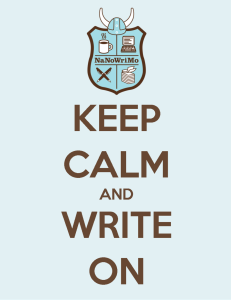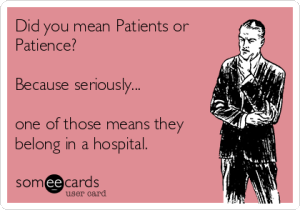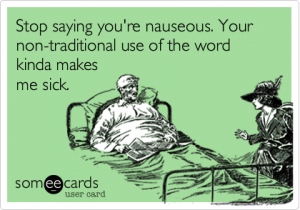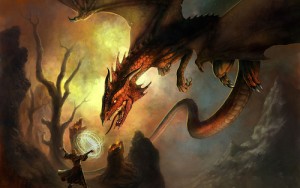by Naomi L. | November 4, 2015 | Blog, Creative Writing |
It’s the first week of National Novel Writing Month, and you know what that means: time to finally sit down and write that novel! Of course, this is much easier said than done, but hammering out 50,000 words in 30 days, daunting as it may seem, is certainly possible. Sometimes all you need to get started on reaching that goal is a bit of motivation.
So to help start you off on your NaNoWriMo journey, here are 10 tips on writing in the form of inspirational quotes from famous authors. Enjoy, and best of luck in this year’s NaNoWriMo!
 1) Be ruthless about protecting writing days, i.e. do not cave in to endless requests to have “essential” and “long overdue” meetings on those days. – J.K. Rowling
1) Be ruthless about protecting writing days, i.e. do not cave in to endless requests to have “essential” and “long overdue” meetings on those days. – J.K. Rowling
2) If you don’t have time to read, you don’t have the time (or the tools) to write. Simple as that. – Stephen King
3) This is how you do it: you sit down at the keyboard and you put one word after another until it’s done. It’s that easy, and that hard. – Neil Gaiman
4) No tears in the writer, no tears in the reader. No surprise in the writer, no surprise in the reader. – Robert Frost
5) The best time for planning a book is while you’re doing the dishes. – Agatha Christie
6) Substitute ‘damn’ every time you’re inclined to write ‘very’; your editor will delete it and the writing will be just as it should be. – Mark Twain
7) Don’t tell me the moon is shining; show me the glint of light on broken glass. – Anton Chekhov
8) There is nothing to writing. All you do is sit down at a typewriter and bleed. – Ernest Hemingway
9) You must stay drunk on writing so reality cannot destroy you. – Ray Bradbury
10) If there’s a book that you want to read, but it hasn’t been written yet, then you must write it. – Toni Morrison
What are your thoughts on these inspirational writing quotes? Any other favorites you would add to this list?
by Naomi L. | October 21, 2015 | Blog, Creative Writing |
It’s time for some more fun with confusing English words! So far, I’ve shared a list of 25 commonly confused words and phrases and a list of 20 English words that change in meaning when pronounced differently. Continuing on that line, today’s post focuses on homonyms (also called homophones): words that sound the same but that have different spellings and meanings. Homonyms are one of the most confusing types of words for new English speakers to learn, and while my 25 words post already includes some common examples such as “your/you’re” and “their/there/they’re”, there are still plenty of examples of like-sounding words that warrant some attention.
So just for fun, here are 20 sets of homonyms that you should look out for while reading or writing in English. Enjoy!
 1) Aisle/Isle – An “aisle” is a passage between shelves or rows of seats. An “isle” is a small island or peninsula.
1) Aisle/Isle – An “aisle” is a passage between shelves or rows of seats. An “isle” is a small island or peninsula.
2) Capital/Capitol – A “capital” is the most important city of a region. “Capital” also refers to wealth or uppercase letters. A “capitol” is a state legislature building in the United States, while the “Capitol” is the U.S. Congress building in Washington D.C.
3) Click/Clique – A “click” is a short, sharp sound. A “clique” is a small group of people with common interests.
4) Colonel/Kernel – A “colonel” is a high-ranking army officer. A “kernel” is a type of soft and edible seed.
5) Descent/Dissent – A “descent” is an act of moving downward. “Dissent” is an expression of opinions that vary from those previously or commonly held.
6) Discreet/Discrete – To be “discreet” is to be careful and circumspect. To be “discrete” is to be separate and distinct.
7) Exercise/Exorcise – To “exercise” is to practice physical activity to improve health and fitness. To “exorcise” is to drive out an evil spirit from a person or place.
8) Faint/Feint – To “faint” is to briefly lose consciousness. To “feint” is to make a false move meant to distract or deceive, typically during a fight.
9) Foul/Fowl – To be “foul” is to be offensive or wicked. A “fowl” is a domestic bird raised for its eggs and meat.
10) Hoarse/Horse – A “hoarse” voice is rough and harsh-sounding. A “horse” is a hoofed domesticated animal raised for riding, racing, and working.
11) Idle/Idol/Idyll – To be “idle” is to be inactive. An “idol” is someone or something that is greatly admired, or an image of a deity used as an object of worship. An “idyll” is an extremely idealized peaceful and picturesque scene.
12) Knot/Naught/Not – A “knot” is a fastening made by tying a piece of rope or string. “Naught” is zero or nothing. “Not” is an adverb used to form a negative.
13) Metal/Mettle – “Metal” is a solid material that is typically malleable, fusible, and ductile. “Mettle” is a person’s ability to face difficulties with spirit or resilience.
14) Miner/Minor – A “miner” is someone who works in a mine. A “minor” is someone who is underage. “Minor” also refers to what is lesser in significance.
15) Patience/Patients – “Patience” is the virtue of tolerance. “Patients” are people receiving medical treatment.
16) Peak/Peek/Pique – To “peak” is to reach the highest point. To “peek” is to look quickly and secretively. To “pique” someone’s interest or curiosity is to stimulate it.
17) Pore/Pour – To “pore” over reading materials is to be immersed in the study of them. To “pour” is to drop liquid from a container in a steady stream.
18) Principal/Principle – To be “principal” is to be the most significant. A “principal” is a person with the highest authority in an institution. A “principle” is a fundamental truth.
19) Stationary/Stationery – To be “stationary” is to be immobile. “Stationery” is specially printed writing paper.
20) Steal/Steel – To “steal” is to take someone else’s belongings without their permission. “Steel” is a sturdy alloy consisting of iron and carbon.
What are your thoughts on these homonyms? Any others you would add to this list?
by Naomi L. | September 23, 2015 | Blog, Creative Writing |
Have you ever been in the middle of reading and suddenly discovered a word so beautiful you just had to make a note of it? Whether it’s in sound or meaning, the English language is full of beautiful words, many of which we as writers go out of our way to include in stories or poetry to add that special artistic touch to our work. But do you ever wonder what the most beautiful words in the English language are?
Fortunately for the curious among us, someone else has already had the same idea! Dictionary writer and poet Robert Beard has compiled a list of what he believes to be the 100 most beautiful words in English. See how many of these you know and/or want to work into your stories/poetry! Enjoy!

Do you agree with the list of the most beautiful words in English? What are your favorite words from this list? What other words would you include?
by Naomi L. | September 2, 2015 | Blog, Creative Writing |
And once again, we’re back to the silly quirks of English. By now I’ve made quite a few references to the oddities of the English language in a series of “four words” posts on my blog, from words that are often used incorrectly to words that used to mean something different to words that don’t mean what most people think they do. Now for today’s post, I thought I’d have some fun by discussing words that are technically supposed to mean one thing but have been mutated into a different, more common definition by modern usage (although their original meanings are still defended by advocates of traditional, “proper” English).
So just for fun, here are four words that are commonly thought to mean one thing but are actually supposed to mean something else. Enjoy!
Fortuitous should mean “by chance”, not “lucky”
 It’s no wonder how the word “fortuitous” made it onto this list. It has the root fort built into it, so it must be synonymous with “fortunate”, right? That seems to have been the general consensus when the definition “happening by a lucky chance” first came about, but in fact, this word was originally supposed to have a neutral connotation, as in “happening by accident”. The informal positive definition seems to be more common nowadays, however, and this usage has become something of a synonym for “lucky” in modern English (albeit still frowned upon by traditionalists). So if someone tells you about a “fortuitous” event, it was most likely a fortunate occurrence, but the important thing to take away from the story is that it happened by chance!
It’s no wonder how the word “fortuitous” made it onto this list. It has the root fort built into it, so it must be synonymous with “fortunate”, right? That seems to have been the general consensus when the definition “happening by a lucky chance” first came about, but in fact, this word was originally supposed to have a neutral connotation, as in “happening by accident”. The informal positive definition seems to be more common nowadays, however, and this usage has become something of a synonym for “lucky” in modern English (albeit still frowned upon by traditionalists). So if someone tells you about a “fortuitous” event, it was most likely a fortunate occurrence, but the important thing to take away from the story is that it happened by chance!
Momentarily should mean “for a moment”, not “in a moment”
Anyone who has ever taken public transportation such as a train or an airplane is likely to have heard at least once a phrase along the lines of “We will be leaving momentarily.” It is generally accepted that “momentarily” indicates something that will happen “in a moment”, and this is obviously what pilots, conductors, and drivers mean to tell their passengers when their trip is delayed. But “momentarily” traditionally means “for a moment”, as in something that lasts only for a short time, and the former definition of “very soon” is disputed by some as an informal or strictly North American use. Both meanings are acceptable in modern usage, though, so whether you mean to explain that something won’t take long to start happening or to finish happening, “momentarily” should work just fine.
Nauseous should mean “to make sick”, not “to be sick”
Leonard: Now that I’m actually about to go out with Penny, I’m not excited. I’m nauseous.
Sheldon: Ah, then your meal choice is appropriate. Starch absorbs fluid which reduces the amount of vomit available for violent expulsion.
Leonard: Right.
Sheldon: You also made a common grammatical mistake: you said “nauseous” when you meant “nauseated”. But go on.
– The Big Bang Theory (Season 1, Episode 17 – The Tangerine Factor)
Here’s a grammar mistake that’s so common, you’ve almost definitely been making it your whole life without even realizing it. When trying to convey that they feel sick to their stomach, most people go straight for the word “nauseous”. What they really mean to say, however, is “nauseated”, as “nauseous” traditionally refers to something that induces nausea. By this definition, people who are trying to say they feel sick themselves are accidentally saying they make other people sick instead. But fear not; the formerly incorrect use of “nauseous” is so pervasive in modern speech that it’s already been added to the dictionary as the primary definition of the word. So yes, if the questionable meat you ate for lunch is making you queasy, feel free to say you’re feeling “nauseous” or “nauseated”. Either way, people will understand not to get too close.
Sensuous should mean “of the senses”, not “seductive”
Feeling a little hot and bothered? I wouldn’t blame you; think of the word “sensuous” and your mind is likely to jump to images that might render this post NSFW if I were to describe them here. You may want to think again, though, because “sensuous” isn’t exactly interchangeable with “sensual”. In fact, it’s believed that the former word was coined in the 17th century specifically as an attempt to avoid the sexual connotations of the latter. The traditional definition of “sensuous” is “relating to or affecting the senses rather than the intellect”, with no direct reference to physical gratification. Of course, you’d be hard-pressed to find anyone who makes that distinction these days; the use of “sensuous” as a synonym for “sensual” is so common that only hardcore traditionalists try to maintain the original difference (with little luck, I might add). Take note: if you’re going for a neutral connotation, you may want to choose a different word, because the “sensuous” ship has long sailed.
What are your thoughts on these words? Any others you would add to this list?
by Naomi L. | August 12, 2015 | Blog, Creative Writing |
By now, I’ve written quite a few “five reasons” posts for my blog. I’ve talked about the things I love about flash fiction and poetry, and I’ve listed my reasons for loving romance and science fiction. Now I’d like to get into another of my favorite genres of fiction, if not my absolute favorite: fantasy! This is a genre I fell in love with when I was a child and that I haven’t stopped loving since. So without further ado, here are the reasons I love fantasy. Enjoy!
1) It’s a testament to the boundlessness of human imagination.
 Fantasy is the epitome of human creativity. The very word “fantasy” originates from a Greek word meaning “imagination” (literally “to show at the mind”). In fact, one of the reasons I love reading ancient mythology is that it offers an insight into human imagination from an early point in history. Since prehistoric times, people have been telling stories about the fantastic events that could very well have shaped the world as we know it, and while today we know that such incredible stories about deities and monsters never actually happened, it’s still interesting to see what amazing tales the human mind is capable of dreaming up. And that’s probably why fantasy remains such a popular genre to this day. For me, reading fantasy isn’t just about enjoying a good story; it’s about the thrill of being transported into another person’s imagination. How wonderful is that?
Fantasy is the epitome of human creativity. The very word “fantasy” originates from a Greek word meaning “imagination” (literally “to show at the mind”). In fact, one of the reasons I love reading ancient mythology is that it offers an insight into human imagination from an early point in history. Since prehistoric times, people have been telling stories about the fantastic events that could very well have shaped the world as we know it, and while today we know that such incredible stories about deities and monsters never actually happened, it’s still interesting to see what amazing tales the human mind is capable of dreaming up. And that’s probably why fantasy remains such a popular genre to this day. For me, reading fantasy isn’t just about enjoying a good story; it’s about the thrill of being transported into another person’s imagination. How wonderful is that?
2) It’s the ultimate escape from reality.
Whenever I feel stuck in the monotony of reality (which is often), I like to take a break by indulging in fiction. When I’m really fed up with the real world, I dive headfirst into fantasy, because nothing takes me away from the pressures of life like indulging in a little magic from time to time. Whether it’s writing short stories about dragons, reading a seven-book novel series about young wizards and witches, or playing the hero in a medieval-themed video game, fantasy offers the thrill of escapism like no other genre can. Because what better way to escape from reality than by losing yourself in a world where absolutely anything is possible?
3) Other genres bend the rules; fantasy breaks them.
Two of my favorite genres of fiction are science fiction and fantasy, but sometimes when I compare the two, it’s hard to find the line that distinguishes them. They both feature intricate worlds, highly improbable plots, and characters who are capable of amazing feats. Perhaps the best way to distinguish fantasy from science fiction (or any other genre for that matter) is to consider how they compare to reality, because fantasy is the only genre that makes the truly impossible possible. Alien encounters, artificial intelligence, and dystopian futures technically could be a reality given exactly the right circumstances, but you’ll never see wizards casting magic spells or fire-breathing dragons soaring across the sky. Some things exist purely in our imagination, and that’s exactly what I love so much about fantasy: it pushes boundaries like no other genre can. In a nutshell, science fiction bends the rules, but fantasy breaks them.
4) It brings back the magic of childhood.
Remember when you were a kid, how you loved reading fairy tales and watching animated movies about magical characters who did amazing things? Naturally curious and free of responsibilities as children, we all enjoyed engaging in the wonders of magic, even if it only ever existed in our minds. But growing up has a way of forcing us to put aside our fantasies so we can prepare to face the real world. One of the greatest reasons I’m so fond of fantasy is that it often takes me back to the simpler time of my childhood, a time when it was okay to believe that magic was real and anything was possible if I only wished it with all my heart. Sure, nowadays I don’t longingly watch the skies for an owl carrying my acceptance letter from Hogwarts or feel a twinge of anticipation that I might find a golden ticket whenever I open a chocolate bar, but it’s still nice to keep in touch with that little girl inside who once did. She is, after all, one of the loudest voices that make up the writer in me.
5) It’s incredibly fun to read, write, and play!
Yes, I always end my lists with this reason, but what can I say? It’s always true! Fantasy, when written well, is engaging, exhilarating, stimulating, liberating, and all-around awesome! So the next time you feel stuck in the humdrum of the real world, try taking a break to indulge in a little fantasy. You never know what sorts of amazing adventures await in the imagination until you explore! Enjoy!
What about you? Why do (or don’t) you like fantasy?
 1) Be ruthless about protecting writing days, i.e. do not cave in to endless requests to have “essential” and “long overdue” meetings on those days. – J.K. Rowling
1) Be ruthless about protecting writing days, i.e. do not cave in to endless requests to have “essential” and “long overdue” meetings on those days. – J.K. Rowling



 Fantasy is the epitome of human creativity. The very word “
Fantasy is the epitome of human creativity. The very word “
Recent Comments